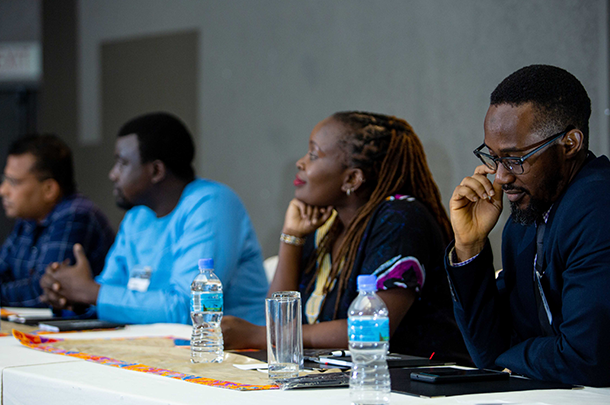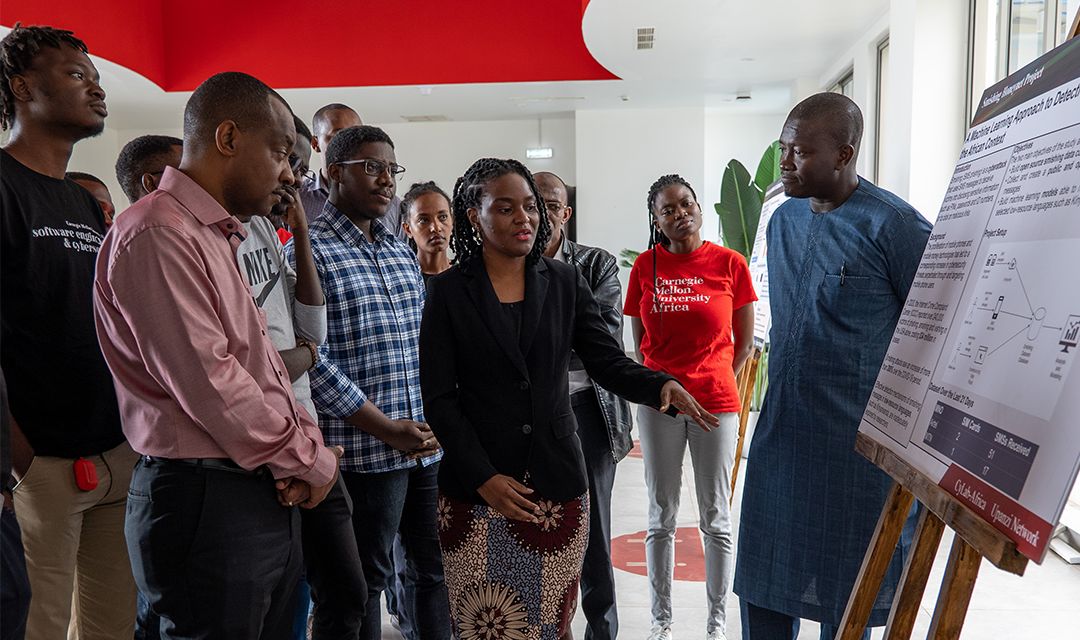Building research capacity across Africa
Afretec is developing an applied African digital knowledge and research ecosystem that responds to continental, national, and sector challenges.
The second founding pillar of the Afretec Network is a commitment by members to build research capacity and capability in Africa. This will be achieved through the formation of a digital knowledge creation ecosystem that will support, promote, enhance, and enable African scholarship in areas of importance to Africa’s digital inclusive transformation. The knowledge creation pillar of the Afretec Network will focus on activities and multi-institution collaborations that enhance research capacity and capability in Africa. This will include activities such as knowledge creation symposia, workshops, research administration programs, and collaborative knowledge creation grants.
The knowledge creation ecosystem aims to provide a platform for researchers to share best practices, enhance research capabilities, and establish multi-institutional research collaborations while pursuing exciting and topical research that contributes toward driving the inclusive digital transformation of Africa.
Hear about research from an Afretec member university
Afretec grants
Afretec recently awarded five $250,000 grants and eight $50,000 grants to build research capacity and accelerate inclusive digital growth throughout the African continent. Each multi-institutional research team will build on existing science, engineering, and technology in disciplines such as artificial intelligence (AI), machine learning, robotics, information technology, and cybersecurity.
2025 full grants
Addressing Heatwaves, Air Pollution, and Human Health in West and East Africa Through High-Frequency Sensor Monitoring and AI-Driven Analysis
- Principal investigator: Rose Alani (University of Lagos)
- Co-investigators: Davies Rene Segera (University of Nairobi), Amadou Thierno Gaye (Université Cheikh Anta Diop)
This project proposes a comprehensive solution that integrates high-frequency (5-second interval) air pollution sensors, a cloud-based real-time dashboard, and AI-driven anomaly detection using a large language model. By combining continuous sensor data with health outcomes and socio-economic parameters, this project will develop tailored policy recommendations, strengthen local capacity, and drive digital transformation in Lagos, Nairobi, and Dakar.
TLC: Teaching, Learning, Creativity Through Digitalization and Integrated Cross-Border Collaboration
- Principal investigator: Reuben Dlamini (University of the Witwatersrand)
- Co-investigators: Habimana Olivier (University of Rwanda), Nqobile Ndzinisa (University of Eswatini), Clement Simuja (Rhodes University)
This research project is expected to generate evidence-based insights into how teacher wellbeing, working conditions, school leadership, and educational policies shape teacher retention, job satisfaction, and attrition in Rwanda, Eswatini, and South Africa. The findings will inform both scientific knowledge and policy reform by offering a holistic framework that addresses systemic challenges in teacher support and inclusivity, ultimately contributing to stronger education systems, improved student outcomes, and sustainable socioeconomic development in sub-Saharan Africa.
AI-Powered Voice Interfaces to Improve Financial Inclusion of Visually Impaired People When Using USSD-Powered Mobile Money Services in Rwanda and Beyond
- Principal investigator: Kizito Nkurikiyeyezu (University of Rwanda and Carnegie Mellon University Africa)
- Co-investigators: Eric Umuhoza (Carnegie Mellon University Africa), Johannes Machinya (University of the Witwatersrand)
In Rwanda, 86 percent of adults rely on mobile money services for essential transactions, but the Unstructured Supplementary Service Data (USSD) powering these services creates significant barriers for visually impaired users. USSD interfaces use text-based menus accessed through dial codes like *182# that generate temporary overlays invisible to screen readers, while lacking audio feedback, imposing strict time limits, and providing no input validation. These accessibility failures force visually impaired individuals to depend on caregivers for transactions, increasing error rates and fraud vulnerability, as they cannot independently verify recipients or amounts. As Rwanda moves toward its goal of a fully cashless society by 2030, these barriers threaten to further marginalize the country's 1.4% visually impaired population from financial independence.
This research addresses this critical gap by developing an AI-powered voice interface smartphone application tailored for Kinyarwanda that enables visually impaired users to navigate USSD menus independently and securely.
Multilayer Biofilter System for Wastewater Treatment and Digital Monitoring in Africa
- Principal investigator: Nadia ARROUSSE (Al Akhawayn University)
- Co-investigator: Hamed Hashemi (University of the Witwatersrand)
The project will be implemented in Morocco and South Africa, with a specific focus on wastewater treatment in pisciculture (fish farming) plants. A key component of the initiative is capacity building by training unemployed graduates from open-access universities in Morocco and South Africa on the development and use of these filtration systems. This initiative aligns with Africa’s digital transformation goals, sustainability strategies, and efforts to promote job creation in the water treatment sector.
Smart Aquaculture: IoT, AI, and Data Analytics for Sustainable African Catfish Farming
- Principal investigator: Oluwagbenga Olanrewaju OLUDE (University of Lagos)
- Co-investigators: Theophilus Akinfenwa FASHANU (University of Lagos), Ahmed Rafea (The American University in Cairo), Gatera Antoine (University of Rwanda)
The initiative envisions transforming aquaculture into a sustainable, efficient, and inclusive enterprise by integrating Internet of Things (IoT), artificial intelligence (AI), and data analytics for precise, real-time decision-making. IoT-enabled sensors will be used for real-time monitoring of critical water quality indicators in earthen and concrete ponds, AI algorithms and data analytics will process the data to detect anomalies and water quality risks, and provide data-driven, precise, and accurate decision support for farm optimization, helping fish farmers take proactive rather than reactive measures.
Ethical, Trustworthy, Autonomous: The Vehicles of Tomorrow
- Principal investigator: Amr El Mougy (The American University in Cairo)
- Co-investigators: Moinak Maiti (University of the Witwatersrand), Sherif Aly (The American University in Cairo), Khalil El Khodary (The American University in Cairo), Alia El Bolock (The American University in Cairo), Daoud Siniora (The American University in Cairo)
This project will investigate approaches for ethical and trustworthy driving for autonomous vehicles.
Human-Centred AI Tools to Reduce Human-Wildlife Conflicts
- Principal investigator: Prasenjit Mitra (Carnegie Mellon University Africa)
- Co-investigators: Titus Adhola (University of Nairobi)
This project will focus on developing AI tools to mitigate human-wildlife conflicts, with a specific emphasis on African contexts. By leveraging advanced machine learning models, the project aims to create predictive tools to forecast and manage potential conflicts, ensuring the safety and coexistence of both humans and wildlife. The researchers will also seek to train students and postdocs in engineering and ecology on how to pursue high-impact social projects in the African context using state-of-the-art AI, too.
2025 seed grants
Modelling Artificial Intelligence Skills Gaps and Upskilling Strategies in the Construction Industries of Developing Countries
- Principal investigator: Oluwaseun Sunday DOSUMU (University of Rwanda)
- Co-investigators: Iniobong Beauty John (University of Lagos), Jesse Thornburg (Carnegie Mellon University Africa), Christine Munanese (University of Rwanda)
The project examines artificial intelligence (AI) skills gaps in the construction industries of Rwanda and Nigeria by identifying the specific competencies required, analyzing demand-supply mismatches, and evaluating effective upskilling and reskilling strategies for the workforce. It will further develop a structural equation model and a digital training framework to guide professionals, policymakers, and stakeholders in fostering AI adoption, enhancing productivity, and driving sustainable digital transformation in the sector.
Fintech Adoption, Financial Literacy, and Financial Inclusion: Experimental Evidence of Small and Medium-sized Enterprises in Kenya
- Principal investigator: Odongo Kodongo (University of the Witwatersrand)
- Co-investigators: Dinah Natto (Daystar University), Peterson Magutu (University of Nairobi), Sedjro Alovokphinhou (University of the Witwatersrand)
The proposed project seeks to establish whether financial literacy plays an important mediating role in the nexus between fintech adoption and usage of financial services. The researchers will conduct a randomized control trial using small and medium-sized enterprises in Kenya.
Integrating Machine Learning Based Approaches to Accelerate Perovskite Materials Discovery and Optimization
- Principal investigator: Francis Wanjala Nyongesa (University of Nairobi)
- Co-investigators: Daniel Wamwangi (University of Witswatersrand), Benjamin Victor Odari (Masinde Muliro University of Science and Technology), Cecil Naphtaly Moro Ouma (African Institute for Mathematical Sciences Research & Innovation Centre)
This project aims to increase access to electricity in sub-Saharan Africa by engaging in the discovery and optimization of existing perovskite solar cell materials using machine learning approaches with the goal of locally manufacturing solar panels in Africa. Capacity building in photovoltaics and the emergence of new partnerships among universities and industries are envisaged.
Privacy and Mobile Money Use in Sub-Saharan Africa
- Principal investigator:Assane Gueye (Carnegie Mellon University Africa)
- Co-investigators: Doudou Fall (Université Cheikh Anta Diop)
This comparative project studies how mobile money users and agents in Rwanda, Kenya, Senegal, and Ghana manage privacy risks and personally identifying information. It will investigate:
- Users' concerns about privacy in mobile money transactions
- The privacy practices of agents in interacting with personal data
- The extent to which privacy regulations in each country overlap with users' and agents' concerns and practices.
Designing Organic Optical Sensors with COMSOL Multiphysics and DFT Simulations: A Pathway to Technological Advancement
- Principal investigator: Siziwe Gqoba (University of the Witwatersrand)
- Co-investigators: Cebisa Linganiso (University of the Witwatersrand), Mildred Airo (Maseno University), Francis Otieno (Maseno University), Innocent Nkurikiyimfura (University of Rwanda), Marie Chantal (University of Rwanda)
The project aims at enhancing sensor efficiency to drive technological innovation. This will not only promote employment growth, but it will open new opportunities in environmental monitoring, healthcare and communication systems.
Integrating Artificial Intelligence and Computational Modeling in Plastic Waste Sorting, Development and Optimization of Biofibre-Reinforced Composites for Sustainable Construction Materials
- Principal investigator: Gaudence Nyirazeyimana (University of Rwanda)
- Co-investigators: George Rading (University of Nairobi), Thomas Ochuku Mbuya (University of Nairobi), Maxime Binama (University of Rwanda), Celestin Nkundineza (University of Rwanda)
This project aims to upcycle plastic and food waste into high-quality biofibre composites for construction materials by using machine learning to better sort commonly used plastics like PET. It will also use experiments and computational modeling to explore different fiber sources that can overcome crop seasonality, ensuring year-round production while reducing waste and protecting the environment in Rwanda and East Africa.
Developing Natural Language Processing-Powered Digital Health Solutions for Low-Resource African Languages
- Principal investigator: Lucienne Abrahams (University of the Witwatersrand)
- Co-investigators: George Okeyo (Carnegie Mellon University Africa), Audrey Mbogho (United States International University - Africa), Ntsibane Ntlatlapa (University of the Witwatersrand), Kgopotso Magoro (University of the Witwatersrand), Ruth Wambua (United States International University - Africa), Jane Muchiri (United States International University - Africa)
The project aims to develop high-quality natural language processor models for three low-resource African languages, for KheLobedu (South Africa), Kidaw’ida (Kenya), and for Kinyarwanda (Rwanda). The focus will be on
- health language data collection and related software development
- digital design and co-creation workshops
- health information content production
- project management.
Digital workshops
Afretec sponsors conferences and workshops that focus on the digital transformation of Africa. The network has recently sponsored and participated in:
2021-2022
- West Africa Conference on Digital Public Goods and Cybersecurity
- Cybersecurity Education, Research, and Awareness Day
- IEEE Power Electronics Conference

Panelists at the West African Conference on Digital Public Goods and Cybersecurity in May 2022.

